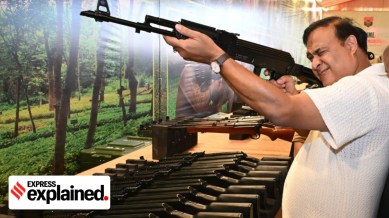While “vulnerable areas” are not clearly defined under the application process, Sarma specifically mentioned regions where Bengali-origin Muslims are in the majority as examples of these.
The portal requires an applicant to specify their identity, providing the broad headings of Scheduled Tribe (Plain), Scheduled Tribe (Hill), Scheduled Caste, Hill Tribes in Plains, Plain Tribe in Hills, Other Backward Classes or Others, and lists the different communities under each heading.
Among other things, they also need to justify their “need for a licence.”
What does the process entail?
Story continues below this ad
Applicants will need to attest that they have no criminal background or pending case against them, and that they have a safe space to store a firearm. Among the documents they will need to provide digitally are proof of date of birth, identity, residence and caste certificates, firearms training certificate, an undertaking on safe use and storage of arms, medical certificates about their mental health and physical fitness, and Aadhaar card.
Sarma said that the government in various districts will create a list of “accredited” people who can provide training to applicants, giving instances of retired police officers and Army officers.
An arms licence issued through this process will be valid for a period of five years.
What is the general process of obtaining arms licences in India?
The acquisition of arms in India is governed by Arms Rules, 2016 framed under the Arms Act, 1959. “No person shall acquire, have in his possession, or carry any firearm or ammunition unless he holds in his behalf a licence issued in accordance with the provisions of this Act and the rules made thereunder,” the 1959 Act says.
Story continues below this ad
Schedule I of the Arms Rules provides a list of prohibited, restricted and permitted arms and ammunition. Those in the prohibited and restricted categories are difficult, if not impossible, to acquire legally, and licences in for such arms and ammunition are directly governed by the Union Ministry of Home Affairs.
Licences for arms and ammunition in the permissible category, however, are governed by State governments. As such, rules for obtaining such arms can differ widely from state to state, and State governments have the authority to reframe licence requirements as long as their rules do not run afoul of the Centre’s Arms Rules.
